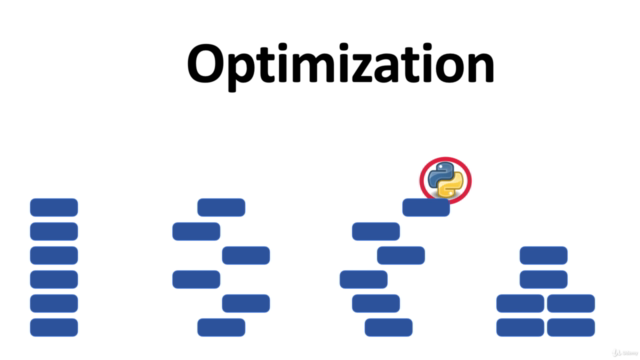
- Description
- Curriculum
- Reviews
Pyomo Bootcamp: Python Optimization
The Pyomo Bootcamp: Python Optimization course is designed to introduce participants to the world of optimization using the powerful Pyomo library in Python. Pyomo is an open-source Python-based optimization modeling tool that is widely used for solving linear, mixed-integer, nonlinear, and dynamic optimization problems. This bootcamp is structured to provide both theoretical understanding and hands-on practice in optimization techniques.
Course Overview:
In this bootcamp, participants will learn how to formulate and solve optimization models using Pyomo, focusing on different types of problems that commonly arise in real-world applications. Whether you’re working in logistics, finance, supply chain management, energy, or any other field that requires decision-making based on complex constraints and objectives, this course will equip you with the skills to tackle these challenges.
Key Features:
- Introduction to Pyomo:
- Overview of the Pyomo library and its capabilities.
- Understanding the basic structure of Pyomo models.
- Installing Pyomo and setting up the development environment.
- Optimization Problem Formulation:
- How to define and structure optimization problems using Pyomo.
- Understanding variables, objectives, and constraints in the context of optimization models.
- Introduction to different types of optimization problems (Linear, Nonlinear, Mixed-Integer, etc.).
- Linear and Mixed-Integer Programming (LP & MILP):
- Solving linear optimization problems (LP).
- Working with mixed-integer linear programming (MILP) to model problems with discrete decisions.
- Practical applications of LP and MILP in industries like supply chain management, resource allocation, and scheduling.
- Nonlinear Programming (NLP):
- Modeling and solving nonlinear optimization problems.
- Exploring techniques for handling nonlinearity in both objectives and constraints.
- Real-world examples where nonlinear optimization is essential (e.g., engineering design, machine learning).
- Dynamic Optimization and Time-dependent Models:
- Understanding dynamic optimization problems.
- Handling time-dependent constraints and objectives.
- Using Pyomo to model systems that evolve over time, such as transportation logistics and energy planning.
- Solver Integration:
- Introduction to different solvers that work with Pyomo.
- Learning how to interface with open-source and commercial solvers (e.g., GLPK, CBC, CPLEX, Gurobi).
- Tips and techniques for improving solver performance and handling large-scale problems.
- Hands-on Projects and Case Studies:
- Building real-world optimization models step by step.
- Working on practical case studies from various domains (e.g., transportation, manufacturing, finance).
- Implementing optimization solutions and analyzing results for decision-making.
- Advanced Topics (Optional):
- Sensitivity analysis and post-optimization analysis.
- Advanced modeling techniques like stochastic programming or multi-objective optimization.
- Tips for scaling optimization problems to handle large datasets or complex models.
Who Should Take This Course?
- Data Scientists and Analysts who want to incorporate optimization techniques into their data-driven decision-making processes.
- Operations Researchers interested in solving complex optimization problems more efficiently.
- Engineers and Technicians dealing with resource allocation, scheduling, and design problems.
- Business Analysts and Decision Makers looking to optimize financial and operational decisions in various industries.
- Researchers and Academics who need to apply optimization methods in their studies or research.
Learning Outcomes:
By the end of the Pyomo Bootcamp, participants will be able to:
- Formulate optimization problems and translate them into Pyomo models.
- Understand the different types of optimization problems (linear, nonlinear, mixed-integer) and how to solve them.
- Use Pyomo to model complex, real-world decision-making scenarios.
- Interact with various solvers and optimize solutions for large-scale problems.
- Apply optimization concepts to improve efficiency, reduce costs, and make better decisions in various industries.
Course Delivery:
This course typically involves a mix of:
- Video Lectures: Theory, modeling concepts, and practical explanations.
- Hands-on Coding Exercises: Writing and running Pyomo code in Python.
- Project Work: Implementing real-world optimization projects and solving case studies.
- Q&A and Discussion: Engaging with instructors and peers to clarify doubts and share insights.
Overall, the Pyomo Bootcamp: Python Optimization course provides a comprehensive foundation for mastering optimization techniques with Pyomo in Python, helping you tackle complex optimization problems effectively.
-
53.1 Biggest rectangle inside a circle
-
63.2 Biggest cylinder inside a Sphere
-
73.3 Fastest route
-
83.4 Heron problem
-
93.5 Steiner problem
-
103.6 System of linear equations
-
113.7 Hostile brothers in a rectangle
-
123.8 Hostile brothers in a circle
-
133.9 Hostile brothers in a triangle
-
143.10 N-Queens
-
153.11 Circle placement in a rectangle
-
163.12 Circle placement in a circle
-
173.13 Circle placement in a half-circle
-
183.14 Circle placement in a triangle
-
193.15 Biggest equal sized circles inside a unity circle
-
203.16 Clash of clans
-
213.17 Biggest circle on a surface with obstacles
-
223.18 Center of mass
-
233.19 Center of mass (negative mass)
-
243.20 Min Queens to cover the chess board
-
253.21 Connected tree
-
263.22 Spanning tree with degree constraints
-
273.23 Connected tour
-
283.24 Conference allocation
-
293.25 Max flow
-
303.26 Graph Node Coloring
-
313.27 Graph Edge Coloring
-
323.28 Facility allocation
-
333.29 Curve fitting
-
343.30 Paper company
-
353.31 Transportation
